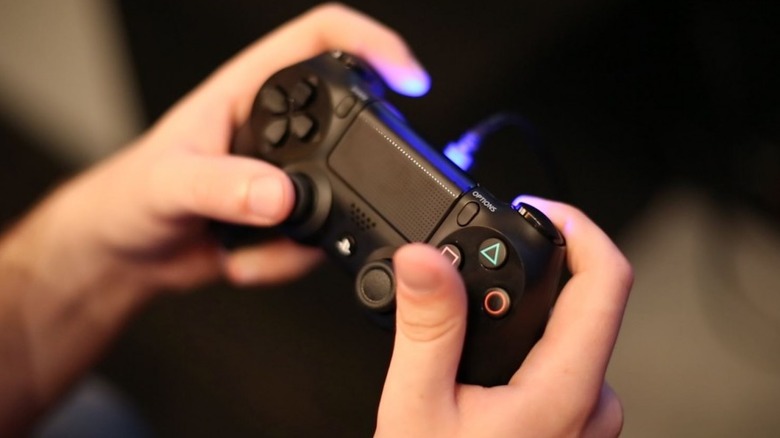New PS5 Controller Wants To Use Your Sweat
While we wait for any announcements regarding the price or release date of the PlayStation 5, it's exciting to find out any new information regarding how the new system will change the way we experience games. In fact, a new patent has just been filed by Sony that may show some interesting new features for the PlayStation 5's controller. While Sony continues to be non-committal about the controller's name (but c'mon, it's pretty likely to be the DualShock 5), we now know much more about what the company may have in store for us when the PlayStation 5 makes its debut.
According to this patent filing, the new controller will feature receptors that actively monitor the player's heart rate and sweat level and adjust certain aspects of play accordingly. In other words, it appears as though the system will keep track of your stress level and find ways to either accommodate or heighten it. While it's not entirely clear how this will be implemented, it should be more than enough to have everyone's minds whirring at the possibilities.
There is one line in the patent description that should be of particular interest to potential PlayStation 5 owners. It appears that these new advancements are being made in the name of providing an all-around immersive experience. Specifically, the new controller design could lead to further innovations in the next generation of home console virtual reality.
As the patent reads, "There is a desire in computer gaming to provide an immersive and highly interactive experience for players, so as to enhance the enjoyment of the player. This has become of particular interest with the increasing availability of head-mounted displays (HMDs), which are provided with the intention of fully immersing a player in the in-game environment."
This mention of head-mounted displays leads one to believe that Sony is placing quite a bit of stock in making PSVR more immersive than ever before. Imagine a VR experience that adjusted to your stress and excitement levels. It could not only make a wild playthrough even more thrilling, but it could even be used (in theory) to lessen the anxiety that some players may experience when using VR.
There have already been rumblings concerning Sony's next version of PSVR, so it would make sense that there would be an attempt to design their next console to work in tandem with the new set-up. Back in October, a patent for a potential new PSVR was uncovered. This patent and the accompanying images showed that Sony may be attempting to go completely wireless with the next version of the PSVR. While motion controls will likely be involved in some way with the new PSVR, it wouldn't be surprising for Sony to find some way of integrating this new tech for the new PS5 controller.
Another interesting thing to note in the patent is Sony's concern with providing enough experiences for the player to make these peripherals worthwhile. As the patent reads, "it is advantageous to provide peripherals that allow a greater range of interaction with a computer game or other application." In other words, it's important for the new controller to be versatile, serving not just VR but a wide spectrum of interactive experiences.
Immersion is obviously a major concern for Sony in designing the PlayStation 5. We have previously heard about the kinds of innovations Sony hopes to make in regards to sound quality. The PlayStation 5 will include a dedicated audio unit that Sony has invested a pretty penny in. In fact, the scarcity of the materials being used in the new console is causing some concerns about the price point and availability of the PlayStation 5 in the future. While there are still some fears regarding the final product, it's clear that Sony is going all-in with their new immersion goals.
Regardless of those worries, let's focus on the positives. It sounds like the new controller will be a leap forward in tech for the company. These steps forward in immersion seem pretty close to what Wired's Peter Rubin described when he had a chance to use the new controller for himself.
Rubin described the controller's system of "'adaptive triggers' that can offer varying levels of resistance to make shooting a bow and arrow feel like the real thing—the tension increasing as you pull the arrow back—or make a machine gun feel far different from a shotgun. It also boasts haptic feedback far more capable than the rumble motor console gamers are used to.'
He called the overall effect "astonishing."
It should be noted that filing this patent doesn't necessarily mean that the features in question will be implemented in the final product. Still, this is a great indicator about where Sony's head is at in regards to the next generation.

